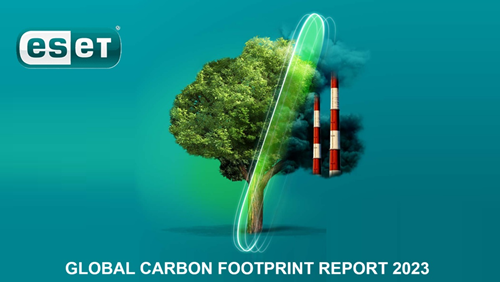ESET, a global leader in cybersecurity solutions, is proud to announce the publication of its 2023 Carbon Footprint Report. This comprehensive report underscores ESET’s dedication to transparency, accountability, and environmental sustainability, reflecting the company’s ongoing efforts to mitigate its environmental impact and progress toward a net-zero future.
ESET Publishes 2023 Carbon Footprint Report
The report reveals that ESET Group’s total carbon footprint for 2023 is 8,146.34 tonnes CO2e using the location-based method and 7,835.06 tonnes CO2e using the market-based method. Greenhouse gas (GHG) emissions per employee amount to 3.38 tonnes CO2e. The majority of the total carbon footprint comes from indirect emissions within ESET Group’s value chain (Scope 3), representing 79% of all emissions.
Compared to 2022, ESET Group’s total GHG emissions increased by 25%, with GHG emissions per employee rising by 16%. The increase is attributed to the inclusion of additional offices previously excluded from data collection, increased business travel attributed to the significant and lasting changes in how businesses operate, driven by the adaptations made during the COVID-19 pandemic, an increase in the number of employees (by 7%), as well as a return to offices in most locations, and more accurate data collection overall year on year.
Despite these increases, ESET has made significant strides in reducing emissions from stationary combustion and fugitive emissions, thanks to implementing various measures to ensure efficient use of heating and cooling through timers, thermostats, and zoning in many offices. That has resulted in an 11% decrease in emissions from stationary combustion, which is due to the use of natural gas and CNG for heating, an 82% decrease in fugitive emissions for A/C unit leakages, and only a 1% increase in purchased heat emissions.
Palo Luka, ESET’s Global COO, said, “We remain committed to our Global Environmental Strategy and will continue to work tirelessly toward reducing our environmental impact. We plan to do this by increasing the use of renewable energy, enhancing energy efficiency, and promoting sustainable practices across all our operations, individually through employees, business partners, and throughout our supply chain. Our ultimate goal is to leave the planet in a better state for future generations.”
According to Luka, the use of renewable energy helps create demand for more sustainable technologies, and the company’s hope is that, where possible, they can contribute toward influencing more options and higher-quality renewable energy sources. In 2023, 36% of electricity consumed in our offices around the world is from renewable sources, with emissions from purchased electricity category contributing the most to the company’s Scope 2 emissions (87%). Furthermore, although energy consumption in our external data centers has increased by 17% between 2022 and 2023, the emissions from external data centers are almost zero as ESET is using responsible providers and 100% renewable energy.
Read the full report here.
Read about ESET’s commitment to environmental sustainability here.
About ESET
ESET provides cutting-edge digital security to prevent attacks before they happen. By combining the power of AI and human expertise, ESET stays ahead of known and emerging cyberthreats – securing businesses, critical infrastructure, and individuals. Whether it’s endpoint, cloud or mobile protection, our AI-native, cloud-first solutions and services remain highly effective and easy to use. ESET technology includes robust detection and response, ultra-secure encryption, and multifactor authentication. With 24/7 real-time defense and strong local support, we keep users safe and businesses running without interruption. An ever-evolving digital landscape demands a progressive approach to security: ESET is committed to world-class research and powerful threat intelligence, backed by R&D centers and a strong global partner network.
For more information, visit www.eset.com.


